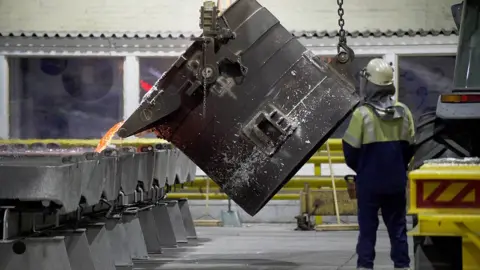Holyrood's soaring cost of industrial rescue

 PA Media
PA Media- When there's been pressure to save a shipyard, airport, fabrication yard and aluminium plant, the Scottish government has been eager to step in and show what can be done.
- It's proving a very costly habit. The most recent auditor report highlights the funds risked by a deal struck to save the Lochaber metals plant has risen from £37m to £161m.
- Failure to apply European funding rules is also eating into the budget for other priority projects, with £45m now written off.
The Scottish government's exposure to losses on its sundry attempts to prop up industry keeps stacking up.
An assessment of the real risk of default on the Lochaber aluminium plant, which it stepped in to save from closure five years ago, has gone up from £37m to £161m.
That's right - a rise of more than four-fold.
The deal with the same Liberty group of metal companies to save the Dalzell steel plant in Motherwell led to an embarrassing admission in the Scottish Parliament chamber this week that state aid rules were broken in the process.
That's in keeping with the problems in spending European structural funds. It turns out that the Scottish government's failure to apply the spending rules, or inability to change course when that was pointed out, has led to a write-off of £45m of grants and costs that cannot now be recouped.
The Scottish government has written off more of the interest on debt run up by its subsidy of Prestwick Airport, running into the millions.
It's stopped making large losses, much of that thanks to the use of Prestwick for refuelling and stopovers by US and other military flights.
A preferred bidder for Prestwick walked away last autumn. The official version is that it was due to uncertainty in the aviation sector due to Covid. From what I've heard, problems have continued this year with the subsequent preferred bidder, discouraged by sellers' indecision, and a failure to agree who is liable for major runway repairs.
Scrutiny and transparency
Scottish ministers this week claim to be moving from the turnaround phase to the happier task of winning new contracts for the Ferguson shipyard in Port Glasgow, where two CalMac ferries are vastly over-budget and overdue. But more investment will likely be required for that.
The two ships were to have cost £97m. The full cost to the Scottish government, including loans to the yard's previous owners, and the £23m gap between the price paid and the half-finished ferries' value, will be well over £200m.
BiFab in Fife and Lewis off the government's hands, and part of the Harland & Wolff network of fabrication shipyards. But the losses of more than £50m are still burning a hole in the Consolidated Government Accounts, with £4.5m added last financial year to ensure contracts were completed as BiFab headed for the administration rocks.
These accounts have been given a close look by the official watchdog - Auditor General Stephen Boyle and his team at Audit Scotland. Their assessment gives an update on a troubled set of assets.
It repeats a point made last year, and also in 2018 by the previous auditor general - that there should be some framework for assessing risk when the Scottish government gets into these politically-charged and high-profile rescue missions. That still doesn't exist, but we're assured there is work being done on it.
Instead, the Scottish government has been busy spending £8.6 billion of extra funding to deal with the Covid crisis. Including non-emergency increases, last year saw a 27% uplift in total spend.
That emergency funding, or lack of it, remains in the headlines this week. But Audit Scotland looks back, and concludes that there has been a lack of transparency in the way the money has been allocated.
 PA Media
PA Media"The Scottish government now needs to be more proactive in showing where and how this money was spent, and show a clearer line from budgets to funding announcements to actual spending," according to Mr Boyle. "This will support scrutiny and transparency of a matter of such significant public interest and importance."
His report has much less alarming news or criticism than the National Audit Office, overseeing Whitehall spending, which recently noted the eye-watering amount of fraud likely to have been perpetrated on the public purse by those taking out Covid interruption and Bounce Back loans. Checks on them came too late, and were inadequate, it said, and the capacity to investigate fraud is relatively tiny.
Financial wheeze
However, let's take a closer look at some of the costs and liabilities that are being increased sharply. The £45m write-off on European funding has little if anything to do with Brexit. This is for the projects that are being wound down over several years after departing the European Union.
The European Commission didn't think the Scottish government was applying the complex accounting rules as required. They halted payments, while St Andrew's House kept them going, in the hope of claiming them back.
Some can and will be claimed back. Negotiations continue with the Commission on how the rules can be applied retrospectively. But it's assumed that substantial sums cannot be claimed back, and will not be, and it's not worth the hassle of even trying. So in addition to £16m that was already written off, the most recent accounts added £29m more.
Meanwhile, in Lochaber, ministers stepped in five years ago this month, to avoid the closure of the aluminium plant and the hydro-electric plant that supplies it, drawing on rainfall across a vast Highland estate that is also part of that facilities' assets.
Audit Scotland revealed last year the true extent of how much exposure was taken on with a guarantee to buy that power if the rest of the operation stopped doing so: a total over 25 years of £586m. We now know the security for this was the smelter, the hydro plant and the land.
 Getty Images
Getty ImagesIn 2020, it was reckoned that the accounting provision for what might realistically have to be paid out under that guarantee was put at £37m.
But then the key funder of the Sanjeev Gupta's GFG metals empire, Greensill Capital, went bust - leaving an embarrassing trail of links back through former Prime Minister David Cameron and into the top levels of the UK government.
The finance house was based on a financial wheeze that it could forward finance ahead of revenue being generated, at a price. The Lochaber rescue was one of its first major public sector deals in Britain.
Funding splurge
When Greensill went south, leaving GFG exposed, the risk went north for the aluminium plant going under and defaulting on its power-purchasing agreement.
It has not done that, yet, but accountants advised the Scottish government they should set aside £161m in case the deal turns sour.
That's also embarrassing. But as with all these other examples, the justification is that jobs are protected, or in the case of BiFab, the prospect of jobs remains open.
No money has been paid out under the deal, emphasises the Scottish government. A spokesman said there are now 200 people working there, up by 40 in the past five years - but only a tenth of the 2,000 jobs that Sanjeev Gupta hoped for five years ago.
His dream of a plant making alloy car wheels has melted, in favour of a recycling plant.
The risk of having to pay out for that energy over the remaining 20 years of the guarantee is now seen as far less than the £438m value of the Lochaber assets as stated by GFG and its complex subsidiary network.
"The guarantee has not been called, while the change in provision is an accounting adjustment only and does not impact Scottish government spending," said a spokesman.
That may be true, but if it's not that serious, and not to be treated as real money, you might wonder: why not splurge this kind of funding guarantee around lots of other businesses? Those other businesses are probably wondering the same thing.
If, outside the state aid rules applied by the European Commission, Scotland and the UK governments get more opportunity to rescue more strategically significant industrial plants, this could become an even more serious drain on resources for other priorities.
